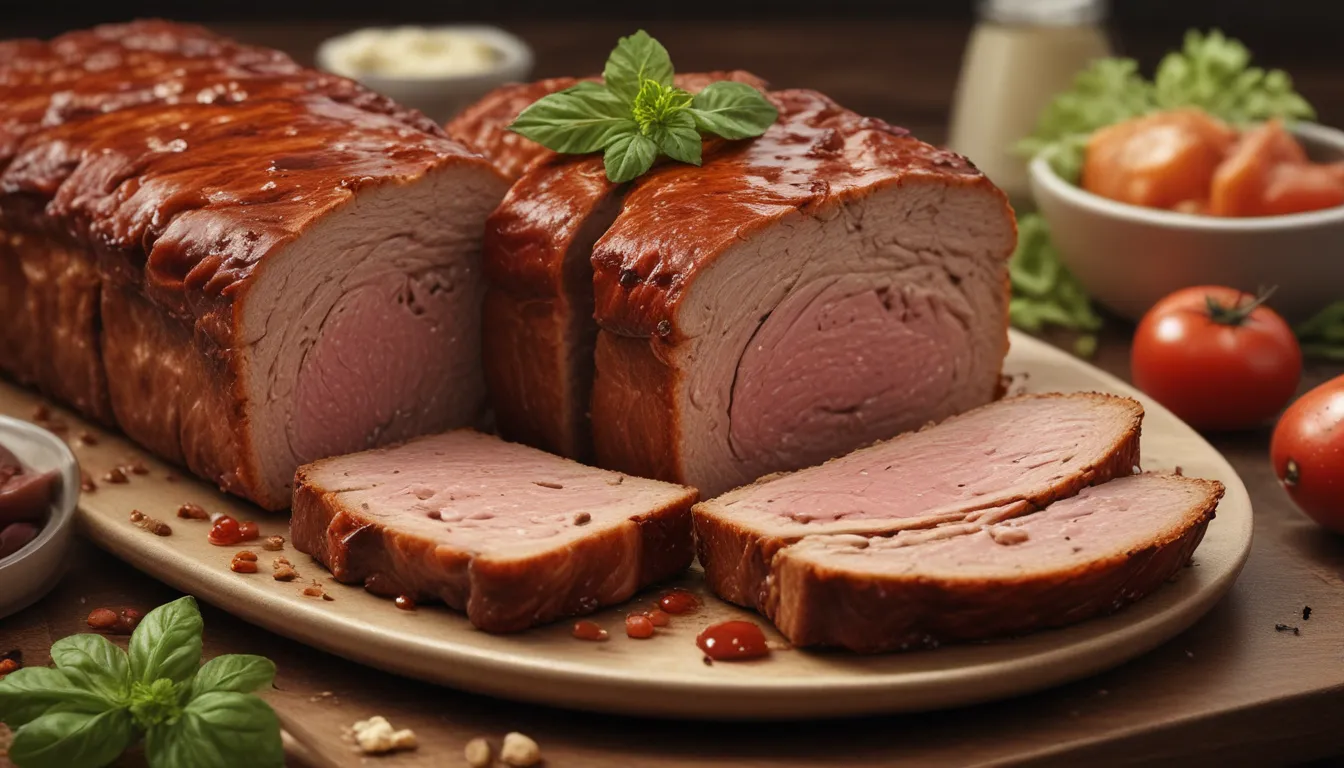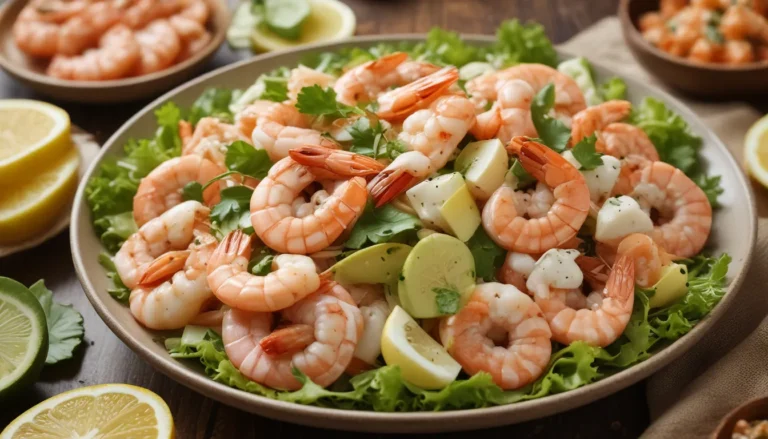The pictures in our articles might not always show exactly what the text is talking about. We use these images to make the article more interesting and eye-catching. They are there to add to the text, but not to replace it or show every detail.
Are you a fan of the classic comfort food, meatloaf? Do you remember fond memories of enjoying this dish at family dinners? While meatloaf is a beloved staple in many cultures, have you ever thought about its nutritional value? In this article, we will delve into 20 essential nutrition facts about meatloaf. With its various ingredients and recipe variations, it's important to understand how different components can impact the nutritional content of this hearty dish.
Understanding the Composition of Meatloaf
At its core, traditional meatloaf typically consists of ground meat, bread or breadcrumbs, eggs, and a variety of seasonings. This combination results in a dish that is rich in protein, carbohydrates, and fats, making it a well-rounded meal option.
The Protein Power of Meatloaf
One of the standout features of meatloaf is its high protein content. A standard serving of meatloaf, roughly about 85 grams or 3 ounces, provides around 14 grams of protein. This makes meatloaf an excellent choice for individuals looking to increase their protein intake for overall health and wellness.
Understanding Fat Content in Meatloaf
While meatloaf is a great source of protein, it also contains a notable amount of fat. The total fat content can vary depending on the type of meat used in the recipe. Opting for leaner meats such as ground turkey or chicken can significantly reduce the fat content compared to ground pork or beef.
Incorporating Carbohydrates into Meatloaf
One unique aspect of meatloaf is the addition of breadcrumbs or oats, which contribute to its carbohydrate content. A typical serving of meatloaf may contain anywhere from 10 to 20 grams of carbohydrates, making it a balanced meal option that provides a mix of macronutrients.
Watching Your Sodium Intake
Due to the seasonings and sauces typically used in meatloaf recipes, this dish can be high in sodium. For individuals who need to monitor their sodium intake for health reasons, it's important to be mindful of this aspect when enjoying meatloaf.
Essential Vitamins and Minerals in Meatloaf
In addition to protein, carbs, and fats, meatloaf also offers essential vitamins and minerals such as iron, zinc, and B vitamins, including B12. These nutrients are crucial for maintaining overall health and well-being and are often found in abundance in a well-prepared meatloaf dish.
The Versatility of Meatloaf
One of the key benefits of meatloaf is its versatility. By making simple ingredient swaps, you can easily customize the nutritional profile of meatloaf to suit your dietary preferences and requirements. Opting for lean meats, egg whites, and whole-grain breadcrumbs can create a healthier version of this classic dish.
Boosting Fiber Content in Meatloaf
While meatloaf may not be inherently high in fiber, incorporating vegetables like bell peppers, onions, and mushrooms can increase its fiber content. Higher fiber intake can promote digestive health and enhance feelings of satiety when enjoying meatloaf as part of a meal.
Considerations for Portion Size
Understanding portion size is crucial when assessing the nutritional value of meatloaf. Larger servings will naturally contain more calories, fats, and sodium, so it's essential to be mindful of serving sizes to maintain a balanced diet.
Sugar Content in Meatloaf
Be cautious of the sugar content in meatloaf, particularly in commercially prepared versions or homemade recipes that use ketchup or barbecue sauce. Monitoring sugar intake is important for overall health and well-being, so it's worth being aware of this aspect when enjoying meatloaf.
Exploring Lean Meat Options for Meatloaf
Opting for lean ground turkey or chicken in your meatloaf recipe can significantly reduce the fat and calorie content without compromising on protein. This is a great way to enjoy meatloaf while keeping your dietary goals in mind.
Plant-Based Meat Alternatives for Meatloaf
For individuals following vegetarian or vegan diets, incorporating lentils, chickpeas, or plant-based meat substitutes can create a meatless meatloaf that still provides a good source of protein. This allows for a versatile and inclusive approach to enjoying meatloaf.
Gluten-Free Choices for Meatloaf
If you adhere to a gluten-free diet, you can replace traditional breadcrumbs in meatloaf recipes with gluten-free alternatives such as gluten-free breadcrumbs, oats, or cooked quinoa. This allows individuals with dietary restrictions to still enjoy a delicious meatloaf dish.
Dairy Considerations in Meatloaf
Some meatloaf recipes may include milk as an ingredient to help keep the loaf moist. If you have dietary restrictions or are watching your dairy intake, be mindful of this aspect and explore alternative ingredients to suit your needs.
Egg Allergies and Substitutes in Meatloaf
Eggs are commonly used as a binding agent in meatloaf recipes. If you have an egg allergy, you can substitute eggs with alternatives like flaxseeds or chia seeds mixed with water to achieve a similar binding effect in your meatloaf.
Low-Carb and Keto-Friendly Meatloaf Options
For individuals following a low-carb or ketogenic diet, opting for alternatives to breadcrumbs such as almond flour or crushed pork rinds can help create a low-carb version of meatloaf that aligns with your dietary preferences.
Considering Cholesterol Content in Meatloaf
Due to its meat content, meatloaf can be high in dietary cholesterol. If you are mindful of your cholesterol levels, consider using leaner meats or incorporating more plant-based ingredients in your meatloaf recipe to reduce overall cholesterol intake.
Micronutrient Variations in Meatloaf
Different types of meats used in meatloaf recipes offer varying micronutrient profiles. For example, beef is rich in iron, while turkey is a good source of selenium. Exploring these variations can add depth to the nutritional content of your meatloaf dish.
Influence of Cooking Methods on Nutritional Content
The way meatloaf is cooked can impact its nutritional profile. Baking is a common and healthier cooking method for meatloaf, while grilling or frying may increase the fat content. Choosing cooking methods wisely can help maintain the nutritional integrity of your meatloaf dish.
The Role of Sides in Meatloaf Meals
The overall nutritional value of a meatloaf meal is influenced by its accompaniments. Pairing meatloaf with steamed vegetables and whole grains can create a balanced and nutritious meal that meets your dietary needs and preferences.
Embracing a Healthy Approach to Meatloaf
In conclusion, meatloaf, a cherished comfort food, can be a part of a healthy and balanced diet. By making mindful ingredient choices, considering portion sizes, and exploring various modifications to suit dietary preferences, meatloaf can offer a nourishing and satisfying meal option that caters to both taste and nutrition.
Final Thoughts on Meatloaf Nutrition
Our commitment to delivering accurate and engaging content drives us to provide valuable information to our readers. Each nutrition fact shared on our platform is contributed by individuals like you, ensuring a diverse range of insights and information. Our dedicated editors rigorously review each submission to uphold the highest standards of credibility and authenticity. As you journey through our content, trust in our dedication to quality and reliability to enrich your learning experience.
Remember, understanding the nutritional benefits of the foods we eat is key to making informed choices for a healthy lifestyle. Enjoy your meatloaf knowing that it can be a delicious and nutritious addition to your meal repertoire.






